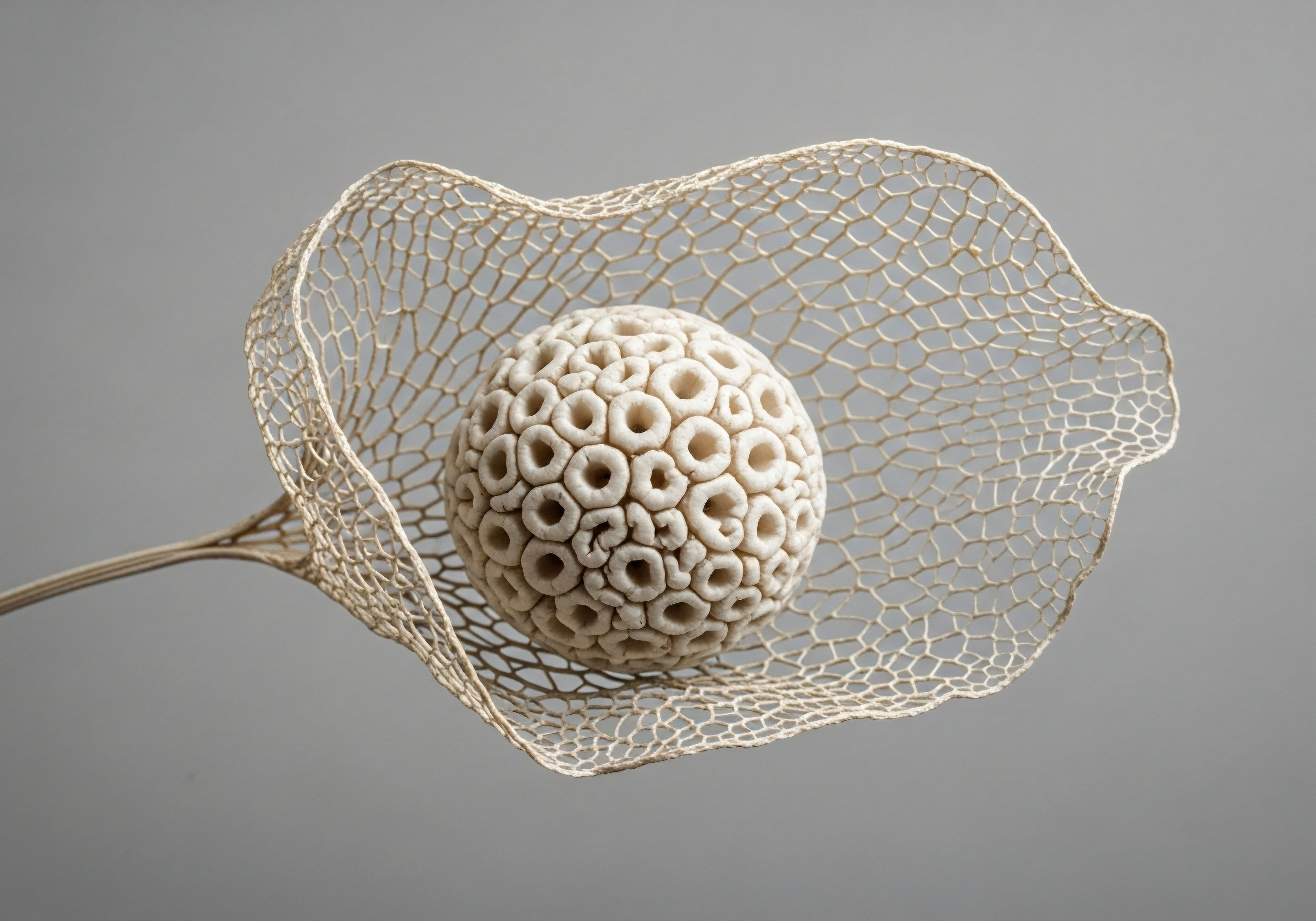

Fundamentals
The journey toward reclaiming vitality often begins with a subtle, persistent whisper from within ∞ a feeling that something is amiss, a departure from one’s intrinsic state of robust health. Perhaps you recognize this sensation ∞ a gradual decline in energy, shifts in mood, or a diminished capacity for physical and mental resilience.
These experiences, though deeply personal, frequently signal an intricate dance occurring within your endocrine system, the body’s profound internal messaging service. Understanding your own biological systems becomes the compass guiding you back to optimal function.
When considering endocrine support, such as hormonal optimization protocols or peptide therapies, a common question arises ∞ can lifestyle adjustments truly mitigate potential risks and amplify benefits? The answer resounds with a clear affirmation. Lifestyle choices are not merely complementary; they are integral co-regulators, acting in profound synergy with any exogenous biochemical recalibration. This perspective validates your lived experience, acknowledging that symptoms are not isolated events, but rather manifestations of complex biological dialogues.
Your daily choices profoundly influence the intricate feedback loops of your endocrine system, acting as powerful co-regulators for any hormonal support.

The Endocrine System an Intricate Symphony
The endocrine system orchestrates a vast array of physiological processes through the secretion of hormones, which function as molecular messengers. Glands such as the pituitary, thyroid, adrenals, and gonads meticulously release these biochemical signals, influencing everything from metabolism and growth to mood and reproductive function. These messengers operate within sophisticated feedback loops, ensuring precise regulation. A disruption in one part of this system frequently creates ripple effects throughout the entire network, leading to the varied symptoms individuals experience.
For instance, consider the hypothalamic-pituitary-gonadal (HPG) axis, a central command center for reproductive and vitality hormones. The hypothalamus releases gonadotropin-releasing hormone (GnRH), stimulating the pituitary gland to secrete luteinizing hormone (LH) and follicle-stimulating hormone (FSH). These gonadotropins then signal the testes in men to produce testosterone, or the ovaries in women to produce estrogen and progesterone.
Lifestyle factors directly influence the sensitivity of these feedback mechanisms, impacting both natural hormone production and the body’s response to external hormonal support.

Why Lifestyle Adjustments Matter with Endocrine Support?
Engaging with endocrine support protocols introduces exogenous hormones or peptides into this already complex internal environment. The body’s capacity to process, utilize, and clear these substances significantly depends on its overall metabolic health and cellular resilience. Lifestyle adjustments provide the essential biological terrain for these interventions to operate most effectively and safely.
A well-nourished body, adequately rested and free from chronic stress, exhibits enhanced receptor sensitivity, more efficient detoxification pathways, and a reduced inflammatory burden. These internal conditions directly influence how effectively the endocrine support integrates with your unique physiology.
Failing to align lifestyle with endocrine support creates a scenario where the body struggles to assimilate the therapeutic benefits, potentially leading to suboptimal outcomes or exacerbating existing metabolic dysregulation. This comprehensive view empowers individuals to recognize their active role in shaping their health trajectory, moving beyond passive reception of clinical interventions toward an active partnership with their own biology.


Intermediate
For individuals already familiar with the foundational concepts of hormonal health, the deeper exploration into lifestyle adjustments alongside endocrine support reveals a sophisticated interplay of biological mechanisms. Understanding the specific ‘how’ and ‘why’ behind these adjustments transforms them from general wellness advice into targeted, clinically relevant strategies. Lifestyle elements serve as powerful modulators of cellular signaling, metabolic clearance, and inflammatory cascades, all of which directly influence the efficacy and safety of hormonal optimization protocols.
Optimizing nutrition, movement, sleep, and stress management directly modulates cellular pathways, enhancing the body’s response to endocrine support.

Nutritional Science and Endocrine Responsiveness
The composition of one’s diet profoundly impacts hormonal homeostasis and the body’s interaction with exogenous endocrine support. Macronutrient balance, micronutrient adequacy, and the presence of bioactive compounds influence critical processes.
- Protein Intake ∞ Adequate protein supports amino acid synthesis, essential for peptide hormone production and neurotransmitter balance. Sufficient protein also aids in maintaining lean muscle mass, which acts as a metabolic reserve.
- Healthy Fats ∞ Cholesterol, a precursor for all steroid hormones (testosterone, estrogen, progesterone, cortisol), originates from dietary fats. Consuming a balanced array of monounsaturated, polyunsaturated, and saturated fats supports hormone synthesis and cellular membrane integrity, influencing receptor function.
- Complex Carbohydrates ∞ Stable blood glucose levels, regulated by complex carbohydrates, prevent insulin resistance, a condition known to disrupt hormonal signaling and accelerate the aromatization of testosterone to estrogen.
- Micronutrients ∞ Vitamins and minerals such as zinc, magnesium, selenium, and B vitamins serve as cofactors for numerous enzymatic reactions involved in hormone synthesis, metabolism, and detoxification.
For those undergoing Testosterone Replacement Therapy (TRT), dietary choices can influence aromatase activity, the enzyme converting testosterone to estrogen. Specific phytonutrients found in cruciferous vegetables, for instance, can support healthy estrogen metabolism. Conversely, diets high in processed foods and refined sugars often promote systemic inflammation and insulin resistance, potentially hindering the beneficial effects of endocrine support and contributing to adverse outcomes.

Movement Protocols and Hormonal Sensitivity
Structured physical activity acts as a potent endocrine modulator. Resistance training and high-intensity interval training (HIIT) specifically stimulate growth hormone release and improve insulin sensitivity. This enhanced sensitivity means cells respond more effectively to both endogenous and exogenous hormones, including those introduced through peptide therapies.
Regular physical activity also promotes healthy body composition, reducing adipose tissue, which is a significant site for aromatase activity. This reduction in fat mass helps maintain a more favorable testosterone-to-estrogen ratio, particularly relevant for men on TRT. Furthermore, exercise supports cardiovascular health, an essential consideration when engaging in any long-term endocrine optimization strategy.

Sleep Architecture and Endocrine Restoration
Sleep is a period of profound physiological restoration and hormonal recalibration. Disrupted sleep architecture directly impairs the pulsatile release of growth hormone and negatively impacts insulin sensitivity. Chronic sleep deprivation elevates cortisol levels, creating a catabolic state that can counteract the anabolic goals of many endocrine support protocols.
Individuals undergoing Growth Hormone Peptide Therapy, for example, often experience enhanced sleep quality as a direct benefit. However, maintaining consistent, high-quality sleep independently amplifies the body’s natural restorative processes, synergizing with peptide action to optimize muscle repair, fat loss, and overall cellular regeneration. Prioritizing 7-9 hours of uninterrupted sleep each night represents a cornerstone of effective endocrine management.

Stress Management and Adrenal-Gonadal Interplay
Chronic psychological or physiological stress activates the hypothalamic-pituitary-adrenal (HPA) axis, leading to sustained elevation of cortisol. This prolonged cortisol exposure can suppress the HPG axis, interfering with natural testosterone and estrogen production. This phenomenon, often termed “cortisol steal,” prioritizes stress response over reproductive and anabolic functions.
For those receiving endocrine support, unmanaged stress can attenuate the desired outcomes. Stress mitigation techniques, such as mindfulness, meditation, deep breathing exercises, and maintaining social connections, serve to downregulate the HPA axis. This creates a more conducive internal environment for endocrine support to exert its intended effects, reducing the physiological burden that might otherwise necessitate higher doses or lead to diminished returns.
| Lifestyle Pillar | Key Endocrine Mechanisms Influenced | Relevance to Endocrine Support |
|---|---|---|
| Nutrition | Hormone synthesis, receptor sensitivity, insulin regulation, detoxification pathways, inflammation modulation. | Optimizes substrate availability for hormone production and metabolism, reduces adverse metabolic load. |
| Movement | Growth hormone release, insulin sensitivity, body composition, cardiovascular health, reduced aromatase activity. | Enhances cellular responsiveness to hormones and peptides, supports favorable hormone ratios. |
| Sleep | Growth hormone pulsatility, cortisol regulation, insulin sensitivity, cellular repair, HPA axis modulation. | Facilitates natural hormonal rhythms, amplifies regenerative effects of therapies. |
| Stress Management | HPA axis regulation, cortisol levels, adrenal-gonadal interplay, inflammatory response. | Mitigates suppressive effects of chronic stress on hormone production and receptor function. |


Academic
The discourse surrounding lifestyle adjustments in the context of endocrine support transcends simplistic correlation, delving into profound molecular and cellular mechanisms that dictate therapeutic efficacy and long-term physiological resilience. A systems-biology perspective reveals that lifestyle interventions are not merely adjuncts; they are epigenetic modulators, mitochondrial regulators, and microbiome shapers, collectively optimizing the milieu for biochemical recalibration.
This deep dive focuses on the intricate molecular dialogue between environmental inputs and endogenous hormonal responses, particularly within the framework of exogenous endocrine interventions.

Epigenetic Modulation and Hormonal Responsiveness
Lifestyle factors exert a profound influence on gene expression without altering the underlying DNA sequence. This epigenetic modulation occurs through mechanisms such as DNA methylation, histone modification, and non-coding RNA regulation. Dietary components, for instance, act as direct substrates or cofactors for enzymes involved in epigenetic processes. Folate, methionine, and choline contribute methyl groups, impacting DNA methylation patterns that can alter the expression of genes encoding hormone receptors or enzymes involved in hormone synthesis and metabolism.
For individuals receiving testosterone replacement therapy, epigenetic modifications can influence the androgen receptor (AR) sensitivity and density in target tissues. A diet rich in micronutrients and phytochemicals, alongside regular physical activity, can promote favorable epigenetic marks that enhance AR expression and downstream signaling.
Conversely, chronic inflammation, often driven by poor dietary choices, can induce epigenetic changes that lead to AR downregulation or resistance, thereby diminishing the therapeutic benefits of exogenous testosterone. This highlights the molecular precision with which lifestyle dictates cellular responsiveness to hormonal signals.
Lifestyle factors precisely modulate gene expression and cellular machinery, directly influencing the body’s capacity to respond to and integrate endocrine support.

Mitochondrial Bioenergetics and Endocrine Function
Mitochondria, the cellular powerhouses, play a central role in steroidogenesis and overall metabolic health. The synthesis of steroid hormones, including testosterone and estrogen, commences with the transport of cholesterol into the inner mitochondrial membrane, a process mediated by the steroidogenic acute regulatory (StAR) protein. Mitochondrial dysfunction, characterized by impaired ATP production, increased reactive oxygen species (ROS) generation, and reduced mitochondrial biogenesis, directly compromises this foundational step in hormone synthesis.
Lifestyle adjustments, particularly consistent exercise and nutrient-dense diets, are potent stimulators of mitochondrial biogenesis and function. Regular physical activity activates peroxisome proliferator-activated receptor gamma coactivator 1-alpha (PGC-1α), a master regulator of mitochondrial content and oxidative metabolism. This enhanced mitochondrial health improves the efficiency of steroid hormone synthesis and clearance, thereby supporting the overall endocrine system.
For those on peptide therapies like Sermorelin or Ipamorelin, which aim to stimulate growth hormone release, optimized mitochondrial function provides the energetic substrate for cellular repair and regeneration, amplifying the peptides’ anabolic and regenerative effects at a subcellular level.

The Gut Microbiome as an Endocrine Organ
The gut microbiome, a complex ecosystem of microorganisms residing in the gastrointestinal tract, exerts a profound and often underappreciated influence on hormonal health. The “estrobolome,” a collection of gut bacteria capable of metabolizing estrogens, regulates circulating estrogen levels by producing beta-glucuronidase, an enzyme that deconjugates estrogens, allowing them to be reabsorbed into circulation. An imbalanced gut microbiome, or dysbiosis, can lead to either excessive or insufficient estrogen reabsorption, impacting both men and women on endocrine support.
Beyond estrogen, the microbiome influences the metabolism of androgens, thyroid hormones, and even neurotransmitters that regulate the HPA axis. Dietary fiber, a primary fuel source for beneficial gut bacteria, promotes the production of short-chain fatty acids (SCFAs) like butyrate, which possess anti-inflammatory properties and support gut barrier integrity.
A compromised gut barrier, or “leaky gut,” can lead to systemic inflammation, a known disruptor of endocrine signaling and a potential exacerbator of risks associated with hormonal interventions. Cultivating a diverse and balanced gut microbiome through whole-food nutrition and targeted pre/probiotic strategies directly supports optimal hormone metabolism and reduces systemic inflammatory burden.
| Lifestyle Modulator | Molecular Mechanism | Clinical Relevance to Endocrine Support |
|---|---|---|
| Targeted Nutrition | Epigenetic regulation of hormone receptor genes, provision of cofactors for steroidogenesis, modulation of gut microbiome (estrobolome). | Optimizes receptor sensitivity, supports efficient hormone synthesis/clearance, balances circulating hormone levels. |
| Structured Exercise | PGC-1α activation for mitochondrial biogenesis, enhanced insulin signaling pathways, reduction of systemic inflammation markers (e.g. CRP). | Improves cellular energy production for hormone action, increases anabolic response, reduces metabolic risks. |
| Circadian Rhythm Entrainment | Regulation of melatonin, cortisol, and growth hormone pulsatility; synchronization of peripheral clocks. | Restores natural hormonal secretion patterns, optimizes anabolic-catabolic balance, enhances restorative processes. |
| Mind-Body Practices | Downregulation of HPA axis, reduction of allostatic load, modulation of neurotransmitter balance (e.g. GABA, serotonin). | Mitigates stress-induced hormonal dysregulation, reduces cortisol-mediated suppression of gonadal axis. |

The Role of Circadian Rhythms in Endocrine Synchronization
The body’s internal clock, the circadian rhythm, intricately synchronizes hormonal secretion patterns. Melatonin, cortisol, and growth hormone exhibit distinct diurnal fluctuations. Disruptions to this rhythm, often caused by irregular sleep-wake cycles, artificial light exposure, or shift work, can desynchronize these pulsatile releases, leading to chronic hormonal dysregulation. For example, growth hormone secretion primarily occurs during deep sleep stages, making consistent, quality sleep paramount for optimizing the benefits of growth hormone peptide therapy.
Entraining robust circadian rhythms through consistent sleep schedules, morning light exposure, and limiting evening blue light, acts as a powerful co-intervention. This synchronization optimizes the timing of endogenous hormone release, creating a more physiologically receptive environment for exogenous endocrine support. The synergy between external intervention and internal biological rhythm ensures a more harmonious and effective integration of therapeutic protocols, minimizing potential physiological discord.

References
- Dhabhar, F. S. (2014). Stress-induced enhancement of the immune response. Annals of the New York Academy of Sciences, 1321(1), 1-13.
- Frankenfield, D. C. (2016). Body composition and energy expenditure. In Krause’s Food & The Nutrition Care Process (14th ed. pp. 119-138). Elsevier.
- Ganong, W. F. (2019). Review of Medical Physiology (26th ed.). McGraw-Hill Education.
- Goodman, H. M. (2011). Basic Medical Endocrinology (4th ed.). Academic Press.
- Haddad, F. & Adams, G. R. (2002). Selected hormones, cytokines and signaling molecules involved in skeletal muscle growth and adaptation. Applied Physiology, Nutrition, and Metabolism, 27(3), 260-271.
- Hormone Health Network. (2020). An Introduction to the Endocrine System. Endocrine Society.
- Lee, D. M. et al. (2019). Association of sleep duration with testosterone levels in men ∞ a population-based cohort study. Clinical Endocrinology, 90(2), 275-282.
- Lumeng, C. N. & Saltiel, A. R. (2011). Inflammatory links between obesity and metabolic disease. The Journal of Clinical Investigation, 121(6), 2111-2117.
- Picard, M. & McEwen, B. S. (2018). Mitochondria as the missing link between stress and disease. Translational Psychiatry, 8(1), 194.
- Tremblay, A. et al. (2011). Impact of exercise on body composition and adipose tissue metabolism. Obesity Reviews, 12(3), 167-179.

Reflection
As you consider the intricate web connecting your daily habits to the very core of your hormonal landscape, reflect on the profound agency you possess. This understanding of lifestyle as a potent co-regulator with endocrine support is not merely academic; it is an invitation to introspection.
Your personal health journey represents a dynamic interplay between internal biochemistry and external choices. Recognizing this intricate dance marks the first step toward a personalized path to sustained vitality and function, one that truly honors your unique biological blueprint.



